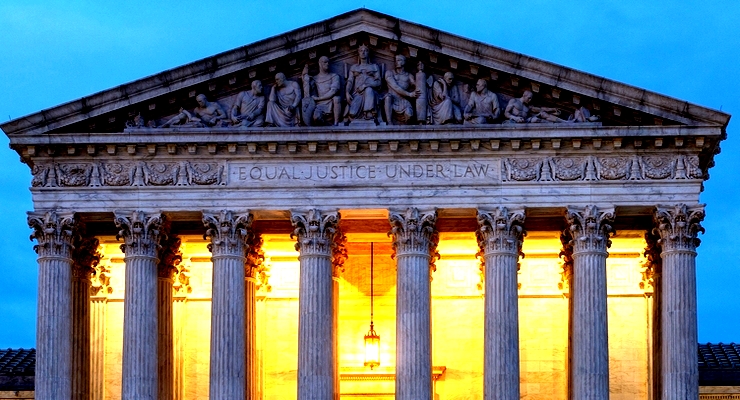
[UPDATED] As anticipated, the Trump administration Thursday asked the U.S. Supreme Court to lift a court order barring federal agents from making immigration arrests via raids that a Los Angeles federal judge determined were carried out without probable cause.
The emergency petition from the Justice Department comes after an appeals court denied the government’s bid to lift the temporary restraining order freezing the raids as they were previously carried out.
“This case involves a district-court injunction that threatens to upend immigration officials’ ability to enforce the immigration laws in the Central District of California by hanging the prospect of contempt over every investigative stop of suspected illegal aliens,” according to the Justice Department’s application to the Supreme Court to stay the lower court order.
The high court will decide whether to grant emergency relief pending further litigation.
In response, Mohammad Tajsar, senior staff attorney at the ACLU Foundation of Southern California, blasted the government’s attempt to overturn the L.A. judge’s order.
“When masked, armed immigration agents abducted people off the streets of Southern California simply because they appear to be Latino or low- wage workers, the entire nation saw how the federal government’s reckless and cruel raids frayed the fabric of one of America’s most vibrant and diverse regions,” Tajsar said in a statement. “The federal government has now gone running to the Supreme Court asking it to undo a narrow court order — applicable in only one judicial district — that merely compels them to follow the Constitution. We look forward to making our case to the Supreme Court that the federal government cannot deprive individuals of their liberty without justification, regardless of their immigration status.”
Friday night, the 9th U.S. Circuit Court of Appeals denied the federal government’s request to reverse the order prohibiting federal agencies — including the U.S. Department of Homeland Security — from continuing what U.S. District Judge Maame E. Frimpong determined were unlawful actions in Los Angeles and surrounding counties.
The roving raids targeting car washes, parking lots where day laborers gather and garment factories disrupted immigrant communities throughout the region for weeks in June and July, causing widespread fear.
On July 11, Frimpong granted temporary restraining orders preventing the government from stopping individuals in violation of the Fourth Amendment and requiring the government to provide detained individuals with access to counsel.
The government appealed the TRO pertaining to immigration stops and requested that the court pause the order while the appeal is pending. A three- judge 9th Circuit panel, all Democratic appointees, denied the request after hearing arguments in San Francisco on July 28.
The appellate panel upheld a finding that federal agents appeared to rely exclusively on race and other factors, such as speaking Spanish, in making arrests.
Frimpong has scheduled a hearing on Sept. 24 in downtown Los Angeles to consider a longer-lasting order known as a preliminary injunction.
In early July, Southern California residents, workers and advocacy groups sued the DHS for allegedly “abducting and disappearing” community members using unlawful stop and warrantless arrest tactics and confining individuals at a federal building in illegal conditions while denying them access to attorneys.
Lead plaintiff Pedro Vasquez Perdomo, 54, a day laborer of Pasadena, says he was waiting to be picked up for a construction job at a Metro bus stop in front of a Winchell’s Donuts in Pasadena on the morning of June 18 when he and two others were surrounded by masked men with guns, arrested and taken to a detention center in Los Angeles, where he remained for three weeks. He has since been granted bond and released.
The men who took Vasquez Perdomo never identified themselves to the plaintiffs, never stated they were immigration officers authorized to make arrests, never stated that they had arrest warrants and never informed the plaintiffs of the bases for their arrests, the lawsuit alleges.
“I am afraid that just standing outside can mean being taken again,” Vasquez Perdomo said recently. “I was targeted because I’m Latino, because I’m a day laborer, because I’m invisible.”
Vasquez Perdomo said he became a plaintiff in the case because “I don’t want silence to be my story. I want justice, for me and for every other person whose humanity has been denied.”
Six of the nine justices on the Supreme Court were appointed by Republican presidents.
White House spokeswoman Abigail Jackson took issue last weekend with the appeals court ruling.
“No federal judge has the authority to dictate immigration policy — that authority rests with Congress and the president,” Jackson said in a statement to City News Service. “Enforcement operations require careful planning and execution; skills far beyond the purview or jurisdiction of any judge. The Trump administration looks forward to continuing to implement its immigration policies lawfully.”













 1 comment
1 comment


